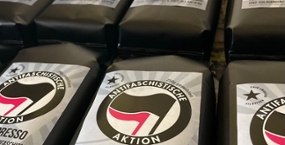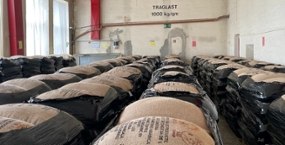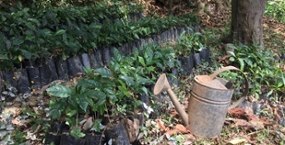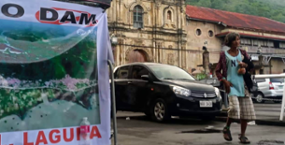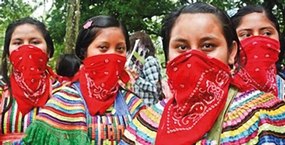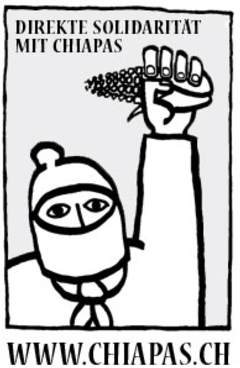Post-colonial exploitation is still dominating world trade
Of raw coffee prices and 'paper coffee'
Mechanisms and problems of conventional coffee trade
Second only to mineral oil, coffee is one of the most important trade goods on earth. About 100 million people are working in the worldwide coffee business. They are employed in cultivation, processing and trade. 80% of the coffee is produced by 25 million small-scale farmers' family units possessing less than 10 hectares of land. Many of them are subsisting on less than 2 dollars a day and are threatened by price fluctuations resulting in poverty and hunger.[1] There have been famines triggered by the raw coffee price's plummeting.
Of more than 150 million sack being harvested on average annually, about 70% are exported. Ca. 1,14 million tons are imported to Germany every year. Typically, the coffee is processed locally and resold internationally. Germany is the world's biggest exporter of coffee products, despite not a single coffee plant growing in this country![2]
Redistribution from bottom to top: Who gets the money?
The figure below illustrates that only the smallest share of a cup of coffee goes to the working people, i.e. those producing the coffee. Little money is paid for production, cleaning, drying and packaging. Transport and processing procedures performed in the industrialised countries, on the other hand, account for more than 80% of the price. Thus, value added, and consequently, possible economic growth takes place in the consumer, not the producer, countries.
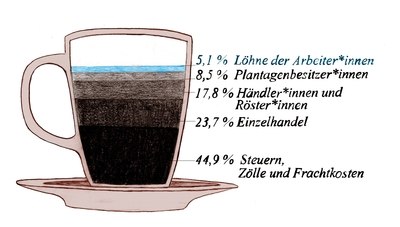
The coffee price
Many factors exert influence on the raw coffee price. On the one hand, supply and demand, in their turn influenced by crop yields; on the other, stock exchange speculation on so-called paper coffee as well as speculative hoarding and commodity futures are causing a drop in prices.
Increasing coffee world market prices do not necessarily mean better prices for farmers. Profit margins are retained by the big traders. Whereas during high-price periods additional coffee is thrown into the world market, when the price drops, contracts are concluded and the coffee is stored. Not unlike other financial transactions: the more small-scale the protagonist, the more likely the occurrence of financial losses. However, the more money there is in the background, the higher the probability of substantial gains. Therefore, bad harvests do not necessarily bring about better prices for farmers. Moreover, there are sufficient global capacities to equalise crop failure in single regions.
Yet, it hasn't always been like that: Due to heavy price fluctuations and the resulting impoverishment of farmers the International Coffee Organization (IOC) had concluded a coffee agreement between producer and consumer countries regulating the coffee world market in 1962. Fixed quotas were applied to all coffee-producing countries to avoid overproduction and price deterioration. After the Cold War, the US opted out of the agreement because its original purpose – to prevent impoverished farmers from joining the communist movement – had become obsolete. Ever since every country can produce and export any quantity of coffee. As prices weren't fixed anymore, many small-scale farmers tended to produce more and more to compensate for per unit losses. This, in turn, has reinforced overproduction. Additionally, more countries -supported by the World Bank - implemented coffee cultivation (e.g. Vietnam), resulting in a further surplus. Hence, the coffee price hit rock bottom. The low price's consequences were felt intensely by farmers: In Ethiopia, a famine occurred, in Latin America, thousands had to abandon their land and were living in the slums in dire poverty and child labour on coffee fields was increasing worldwide.[4]
In the meantime, the coffee price has recovered. Yet, the coffee business still is characterised by heavy price fluctuations, primarily to the producers' detriment.
Additionally, coffee has turned into an object of stock exchange speculation. Prices have therefore to some extent become independent of supply and demand and are behaving more and more in a volatile way. Dieter Overath, manager of TransFair e.V., told the radio station Deutschlandfunk: 'Small-scale farmers cannot react to these fluctuations. They need reliable sales. But their influence on the world market is slight. Therefore, a new coffee agreement appears unrealistic at present.'[5]
Value added in the Global North
The refinement process of raw coffee and the consequent increase of the coffee price of about 1 euro per kilo up to 1000 euro per kilo for special coffees primarily takes place in rich industrialised countries like Germany. A substantial proportion of the coffee price is covering taxes and marketing costs instead of benefiting the farmers.
Besides value-added tax of 7%, in Germany coffee is subject to a coffee tax of € 2,19 per kilo roasted coffee. This tax - socially unfair anyway due to not being proportional to income but a consumption tax – is neither benefiting the production countries but Germany and the EU as economic locations and dominant players in world trade. Thus, global injustice is perpetuated and a huge proportion of value added stays in the North. Import duties also impede the development from raw material supplier to more sophisticated production chains and the establishment of more stable local economic structures.
Furthermore, European low-interest policy is exerting a negative influence. ECB's depreciation and inflation strategy are true to the post-colonial logic of promoting exports which will result in state debt vanishing into thin air due to inflation. This model relies on heavy price pressure and on keeping purchase prices of raw materials as low as possible compared to value added in the local economic sphere. Moreover, this development is reinforcing speculative bubbles and speculation on paper coffee and other food in the financial market.
Low-interest policy is promoting conventional trade in particular because currency fluctuations have a stronger impact on participants in fair or solidary trade. Higher consumer prices especially aggravate the poorer population segment already concerned by increasing rents; at the same time, low-interest rates are benefiting well-off players investing in real estate. This is additionally tightening the market situation – a race to the bottom affecting all.
Coffee quality and roasting methods
Coffee trade and consumption are characterised by colonial history: Originally, it had been cultivated for export and thereby for rich industrialised nations only. As a consequence, until today the best products are exported. On the other hand, coffee processing in import countries is more complex. There are substantially higher expectations as coffee flavour is concerned and numerous instructions have to be executed regarding roasting, coffee machine, grinding, the heat of the water used for brewing etc. before you can enjoy your drink. Many processing and refinement procedures are very sophisticated and to some extent even patented [6] The considerable gourmet coffee sector also illustrates coffee expertise and the status of coffee as a luxury good.
As the coffee's taste has top priority, roasting has to be as fresh as possible. Consequently, producer countries frequently can't compete with the industrialised nations' coffee culture and don't get the chance to export roasted coffee because due to long delivery and storage periods loss of quality and flavour would occur and a market would be difficult to find. Therefore, it is not a surprise that merely 5% of roasted coffee is exported.[7]
These factors are contributing to producer countries participants' difficulties to access the European coffee market and to develop a role beyond mere raw coffee supplier. Increased accessibility of small-scale players to logistics solutions and networks of solidarity, as well as improvement of infrastructure and local vocational training programs, are broadening local producers' options.
Monopolies
Coffee trade is dominated by five multinational trade and roasting companies.[8] Small-scale farmers' voice and influence on these corporations' pricing policy are negligible. Due to these monopolies, alternative price and trade structures can be realised in market niches only. Un-organised farmers remain in one-sided dependency. Even Fairtrade is merely a niche product, Fairtrade coffee's share in the market as a whole amounts to 4,4%.[9]
Naming the problem
Unfortunately, unequal and unfair trade relations are not the exception but the rule. Capitalist exploitation logic is defining the usual market mechanisms and is resulting in devastation of people and nature, misery and impoverishment. Armed conflicts and climate change are just the tip of the capitalist iceberg.
Equally unfortunately, as the global market logic is absolutely penetrating, we (Café Libertad) are also caught in this area of conflict. What it comes down to in practice is that we are negotiating as justifiable as possible prices but we are not existing in any utopian vacuum.
Paramount to us is questioning and fighting the capitalist system as a whole. Unfortunately, there is no sign of the system's immediate abolition. We, therefore, have to make do with a couple of political demands for direct alleviation of the producers' situation. For these reasons, there are demands of various groups and organisations (like Forum Fairer Handel (FFH)):
- * A ban on the import of resources and goods produced under less-than-minimum wage conditions.
- * Immediate stop of speculation on and stock exchange trade of food.
- * Companies' burden of proving their entire delivery chain complying with ecological and human rights standards. These agreements are to have legal prejudice over trade agreements (see FFH).
- In case of breach of the duty to exercise due care, concerned parties from abroad have to be able to sue German companies in German courts (see FFH).
- * 'European agricultural policy is to be supervised and has to be coherent with sustainable aims of development. There is regular monitoring of its consequences on markets in the South as well as complaint mechanisms for producers in developing countries.'[10]
Fairtrade has been established to counter these exploitative structures instead of just putting forward demands. Unfortunately, the numerous labels and seals are frequently contributing to confusion instead of clarifying the above-mentioned standards.
[1] https://www.fairtrade-deutschland.de/produkte-de/kaffee/hintergrund-fairtrade-kaffee.html (29.01.2018)
[2] All Info: Deutscher Kaffeeverband https://www.kaffeeverband.de/de/kaffeewissen/handel#welthandel-fakten (29.01.2018)
[3] Statistisches Bundesamt von 2007: www.statsta.com. Illustration: Eva Müller, http://www.evamueller.org
[4] http://www.deutschlandfunkkultur.de/internationales-kaffeeabkommen-gescheiterte-hilfe.932.de.html?dram:article_id=273044 (29.01.2018). See also: Jean Ziegler (2005): Das Imperium der Schande.
[5] ibid.
[6] http://www.deutschlandradio.de/archiv/dlr/sendungen/patentes/179741/index.html (9.2.2018) regarding the complicated espresso-making process: http://www.spektrum.de/magazin/von-der-bohne-zum-espresso/829764
[7] https://www.kaffeeverband.de/de/kaffeewissen/handel#kaffeewissen-slider-78 (9.2.2018)
[8] 1. Nestlé 2. Mondelez 3.D.E.Master Blenders 4. Green Mountain 5 Tchibo. These statistics date from 2013. However, recently Mondelez und Douwe Egberts have merged and managed to become the new number 1 (headquartered in the Netherlands). In Germany, three suppliers are distributing 45% of the market among themselves: 1. Jacobs Douwe Egberts 2. Tchibo 3. Nestlé (in 5th place, there is Darboven, after Melitta)
https://de.statista.com/statistik/daten/studie/300720/umfrage/fuehrende-unternehmen-in-der-kaffeeherstellung-weltweit/ (29.01.2018)
[9] Forum Fairer Handel (2017): Aktuelle Entwicklungen im Fairen Handel. https://www.faire-woche.de/fileadmin/user_upload/media/fairer_handel/zahlen_fakten/2017-07-20_aktuelle_entwicklungen_im_fh_2017.pdf (31.01.2018)
[10] http://www.forum-fairer-handel.de/politik/visionen-des-fh/ (29.1.2018)

